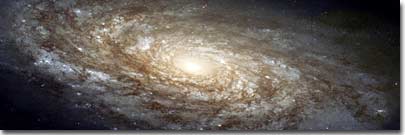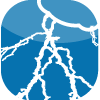The Cosmic Zoom
By Robert L. Park

The following is an excerpt from Voodoo Science. Reprinted by permission of the author.
For a million years, our species was confronted with a world we could not hope to understand. Now, almost within the span of a single human lifetime, the book of nature has been opened wide. On its pages we are finding, if not a simple world, at least an orderly world in which everything from the birth of stars to falling in love is governed by the same natural laws. Those laws cannot be circumvented by any amount of piety or cleverness, but they can be understood. Uncovering them should be the highest goal of a civilized society. Not because scientists have any claim to greater intellect or virtue, but because the scientific method transcends the flaws of individual scientists. Science is the only way we have of separating the truth from ideology, or fraud, or mere foolishness.
Ideology, fraud, and foolishness are all present in the examples of voodoo science discussed in these pages. For those who intentionally set out to commit fraud we can have little sympathy. But most of the scientists and inventors we met started out believing that they had made a great discovery overlooked by everyone else. While it never pays to underestimate the human capacity for self-deception, they must at some point begin to realize that things are not behaving as they had supposed.
Like all those who have gone down this road before them, they will have reached a fork. In one direction lies the admission that they may have been mistaken. The more publicly and forcefully they have pressed their claim, the more difficult it will be to take that road. In the other direction is denial. Experiments may be repeated over and over in an attempt to make it make it come out "right," or elaborate explanations will be concocted as to why contrary evidence cannot be trusted. Endless reasons may be found to postpone critical experiments that might settle the issue. The further scientists travel down that road, the less likely it becomes that they will ever turn back. Every appearance on nationwide television, every new investor, every bit of celebrity and wealth that comes their way makes turning back less likely. This is the road to fraud.
Few if any scientists are so clever or so lucky that they will not come to such a fork in their career. Almost all will acknowledge their error and put it behind them. Some will start down the road of denial but recognize in time that they are headed in the wrong direction and turn back. A surprising number— apparently unable to face turning back, and yet unwilling to follow the road all the way to fraud—seem to leave the road entirely, completely losing touch with reality. No matter how difficult it becomes to keep believing, it is easier than facing the truth.
They pose no great threat to science. Voodoo science is a sort of background noise, annoying but rarely rising to a level that seriously interferes with genuine scientific discourse. Something like cold fusion might interrupt the flow of science for a few months, but those who make extraordinary claims must eventually produce the evidence. The more serious threat is to the public, which is not often in a position to judge which claims are real and which are voodoo. Those who are fortunate enough to have chosen science as a career have an obligation to inform the public about voodoo science.
Most people who are drawn to voodoo science simply long for a world in which things are some other way than the way they are. Some cannot accept that we are prisoners of the Sun. They look wistfully at the stars that fill the night and imagine that there must be some way to overcome the limitations of space and time. Others refuse to believe that the dreams and emotions that stir within them can be reduced to the laws of physics. They seek in science some evidence of a cosmos that cares about tbem. All that scientists can do is to explain what we have learned, and we have learned a lot.
In 1996 I attended a showing of Cosmic Voyage, a new IMAX film at the Air and Space Museum in Washington that captured the state of our knowledge of the universe. I was unprepared for the film's emotional impact. Would it, I wondered, have a similar effect on nonscientists? When I returned to the office, I asked my secretary if she would view the film and give me her impressions. Delia is well read and sensitive to the human condition, but she has no background in science. She agreed, not knowing what to expect.
She was almost overcome. As the "cosmic zoom" hurled viewers to the outer limits of the universe, plunged them down to the domain of the quark, and sent them tumbling back through billions of years, one factor of ten at a time, she was terrified—terrified by her growing realization of the insignificance of Earth and its creatures. Galaxies collided, stars exploded, worlds were obliterated. Humans were powerless before such forces. But terror mingled with wonder. Wonder that fragile, self-replicating specks of matter, trapped on a tiny planet for a few dozen orbits about an undistinguished star among countless other stars in one of billions of galaxies, have managed to figure all this out. That is perhaps the strangest thing about the universe. Strange and very wonderful.
Robert Park is Professor of Physics and former chairman of the Department of Physics at the University of Maryland. He also directs the Washington office of the American Physical Society. Park posts a provocative weekly electronic column called What's New? on science issues that is avidly read by scientists, journalists, and government officials.











